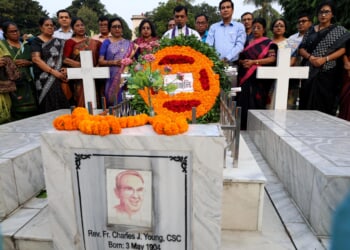Josephine Baker’s Secret War
By Hanna Diamond
Yale University Press, 352 pages, $35
Hemingway called her “the most sensational woman anybody ever saw.” If you read any well-informed account of the life of le tout Paris between the wars, you’ll almost certainly run across her name. Before picking up Hanna Diamond’s eye-opening new book, Josephine Baker’s Secret War, all I knew about her was that she was an obscure black American woman who moved to France and almost instantly became a star of the stage — and, occasionally, screen. Yes, she apparently sang effectively, and she was by all accounts a spectacularly original dancer (whose outfits could be shockingly revealing), but aside from those gifts, she was universally described as having a quality about her — an “it” factor — that I’ve never seen anybody elucidate usefully. Instead they’ve made do with labels. Captivating. Alluring. Intriguing. And, yes, sexy. Until now, I had no sense of her whatsoever as a three-dimensional human being: nearly always, when her name is mentioned in cultural histories, it is as a symbol of an era, a legendary embodiment of Jazz Era glamour, a woman of color who, treated as a second-class citizen in Jim Crow America, became in France something close to an object of worship. Viewed from the perspective of a century later, she can seem almost unreal, a figure who, for all her fame, remains something of a mystery.
But Diamond has changed that. She has not only given us a full-bodied portrait of Baker but has also assembled an account of a woman who, it turns out, was not only an unusually charismatic entertainer but — believe it or not — a courageous spy for the Allies during World War II.
Born in 1906 into a poor family in East St. Louis, Freda Josephine McDonald (she acquired her stage surname from the first of her three husbands), Baker went to New York, danced in a Broadway chorus line, then appeared in a revue in which she was discovered by the wife of a Paris-based U.S. diplomat. Hired to perform in that city, she arrived in Europe in September 1925 and, merely a week later, after doing her “danse sauvage” in the “Revue nègre” at the Théâtre des Champs-Élysées, was “the talk of the town.” Soon she was dividing her time between performing in music-hall shows and singing in her own nightclub. Beginning in 1928, she spent two and a half years touring Europe and South America, singing her signature tune, “J’ai deux amours,” and winning acclaim everywhere. Returning to France, she branched out to talkies and to French operetta — the latter move cementing what had been an increasing if seemingly improbable tendency to view this black American woman as “a potent symbol of France, its commitment to freedom and the accomplishment of its colonial project.”
The very fact that Baker seemed a thoroughly unlikely spy turned out to be a huge plus: wherever she went, nobody ever suspected what she was up to.
When the war began in 1939, Baker, impatient to demonstrate her devotion to the country that had made her a star, volunteered to work as a spy for the French. At first Jacques Abtey, a counterintelligence officer to whom she was introduced, flatly rejected the idea, unable to imagine the queen of cabaret as an undercover agent. Soon, however, they were partners in espionage (and, eventually, lovers), operating in cities across unoccupied Europe and North Africa — especially in Spanish and French Morocco. The very fact that Baker seemed a thoroughly unlikely spy turned out to be a huge plus: wherever she went, nobody ever suspected what she was up to. If she needed to travel to a city to engage in clandestine activities, she could arrange a concert date there tout de suite. When she crossed borders, customs officials weren’t interested in seeing her papers or frisking her (if they’d done so, they’d have found sensitive documents pinned to the insides of her garments) but in getting her autograph. And wherever she went — Lisbon, Madrid, Marrakesh, Casablanca, Algiers, Tunis, Cairo, Beirut — there were rich and powerful people who were eager to throw parties in her honor, to which they would invite other rich and powerful people (including German diplomats, as well as Spanish and Portuguese officials with German connections) who, after a drink or two, would seek to impress the world-famous Miss Baker by indiscreetly sharing classified information. And when they didn’t mean to share it, she overheard it. “If they had known!” she said after one soirée. “I was listening! I missed nothing. The Spanish officers were chatty.” They were also generous, granting her a permanent travel visa that made her espionage work far easier than it was for Abtey, who often found himself twiddling his thumbs while Baker moved with ease from one country to another.
Before long, Baker was working not just with the French but also with the British and with a corps of Americans who would later form the OSS (and, still later, the CIA) and who were in North Africa to prepare for Operation Torch, the Allied invasion that began on November 8, 1942. Baker’s involvement with them caused her relationship with America, writes Diamond, “to grow and deepen in ways she could never have anticipated.” She, in turn, proved indispensable to the Yanks’ preparations. In a document whose contents Diamond reveals here for the first time, Lt. Paul Jensen, the director of the U.S. counterintelligence unit stationed in Marrakesh, stated that Baker, acting “at great risk to her life,” had been “our No. 1 contact in French Morocco,” her “intimate knowledge of the situation in Marrakech” enabling them to “vitiate the subversive efforts” of local German officials and to “curtail enemy communications.” In addition to providing “the names of Nazi espionage agents in hiding,” Baker helped the Americans to befriend leading members of the Arab community, whose own store of information led to the capture of a German general and the arrest of several hundred German agents. The French praised her too, with one report declaring: “Her devotion is boundless and completely disinterested. With a quick and dynamic mind, Josephine is capable of rendering us great service in the study of the circles of the great Moroccan chiefs, a milieu where she could hardly be better accepted.”
Her encounters with the American military, to be sure, had a negative side. Although the GIs generally treated her with great respect, some of the white soldiers spouted racial epithets. Her Arab friends asked her: “How can the U.S. honestly present us with the Atlantic Charter when their policies towards their own nationals are so obviously based on old racist prejudices?” When performing for American troops, Baker took her own little stand against segregation, requiring that at her shows — unlike those of other entertainers — black soldiers were permitted to sit in the front rows. (Baker also made sure to spend time with the black GIs, and even wrote to many of their parents; performing in the U.S. years later, she would be approached by some of those parents, who had brought her letters with them.) Yet Baker chose to look at the bright side of her encounters with the Americans, telling a reporter that she was pleased to have discovered “that all of America is not prejudiced against the Negroes” and that she was “proud and thrilled at the great advancement my race is making in this war.” She now had, she said, two purposes in life: “First, I want to do what I can to win the war and thus perform whatever duty I can for my native land. Second, I want to help those of my own race.”
There was, however, one exception to Baker’s plain talk on race and prejudice. While criticizing America’s failings, she stayed mum on France’s. Her friends in the Maghreb sought freedom from France, but Baker’s patriotism made it impossible for her to take their side; on the contrary, in response to requests from above, she did her best “to restrain the most extreme elements within the nationalist movement” in North Africa, and in doing so, according to one observer, “powerfully supported the very precarious situation of France.” By this point her devotion to la belle Republique was palpable to all and sundry: when entertaining French troops, noted a reporter for Variety, “the applause is more, deeper, nearer the heart, than just that accorded a popular artist.” How curious it was, the reporter wrote, that an “unknown colored girl from St. Louis … symbolizes Paris for thousands of Frenchmen.” Baker was, moreover, not just a patriot but a Gaullist: first introduced to the Free French general at a gala in Algiers in August 1943, she went on to become his close friend and frequent correspondent.
In Josephine Baker’s Secret War, Hanna Diamond has established one thing for all time: that Josephine Baker was a world-class heroine. In the course of performing her espionage duties, she survived a deadly car accident in Africa, a plane crash off the coast of Corsica, and two near-fatal illnesses that kept her bedridden for weeks at a time. When not entertaining troops in combat zones, she sang to countless patients in innumerable hospitals, and when Allied soldiers liberated Buchenwald, she was on the scene to sing to former prisoners. And her service continued after the war: following the liberation of Paris, Baker, who had returned home as soon as it was possible, was delegated by the French government to play hostess to the Sultan of Morocco with the goal of “mak[ing] him feel good” about North Africa remaining in French hands.
Baker’s postwar years brought new triumphs, but also new travails. Visiting New York in 1949, she was refused dinner at the famous Stork Club — an incident that led the newspaper columnist Walter Winchell, who happened to have witnessed it, to make her the heavy, labeling her a Communist and charging that she’d spent the war “wining and dining the Nazis.” In response, Jensen, who in the aforementioned document had called Baker the Americans’ “No. 1 contact in French Morocco,” spoke out in the press, explaining in detail how she’d “risked her life” for America and stating that she was “responsible for his winning the Silver Star.” As it happens, furthermore, another celebrity had been at the Stork Club that night: Princess Grace of Monaco, who, when Baker fell on hard times in later years, gave her a house on the Riviera and, after Baker’s death in 1975, arranged for her to be buried in Monaco.
How, you might wonder, could the beloved Josephine Baker have fallen on hard times? The answer is that she overextended herself, expanding her chateau in the rural Dordogne into a tourist resort and, over the course of the 1950s, adopting no fewer than a dozen children from around the world, many of whom she snapped up while on tour. (In an exceedingly inappropriate move that seems thoroughly out of character, she made a public spectacle of what she called her “rainbow family,” putting them on display for visitors to her resort as living emblems of racial harmony.) In 1961, after a long and inexplicable delay, she was awarded the Légion d’honneur and the Croix de Guerre avec palme. Two years later, she spoke at the March on Washington, saying: “I have walked into the palaces of kings and queens …. But I could not walk into a hotel in America and get a cup of coffee.” Yet even as she challenged segregation in America, Baker persisted in her refusal to bad-mouth France: during the Algerian war (1954-62) her patriotism stayed rock-solid; in May 1968, when left-wing students took to the barricades, she stood up for de Gaulle. And in 2021, forty-six years after her death, she became the first black woman to be inducted into the Panthéon, taking her place alongside the likes of Voltaire, Zola, and Rousseau — a well-deserved honor for a woman whose wartime record, revealed in its entirety for the first time in Josephine Baker’s Secret War, makes it clear that she was, in fact, far more remarkable than even her most ardent admirers imagined.
READ MORE from Bruce Bawer:
The Sandersons Fail Manhattan Shows How Radicals Have Captured Western Institutions

![Scott Bessent Explains The Big Picture Everyone is Missing During the Shutdown [WATCH]](https://www.right2024.com/wp-content/uploads/2025/11/Scott-Bessent-Explains-The-Big-Picture-Everyone-is-Missing-During-350x250.jpg)














